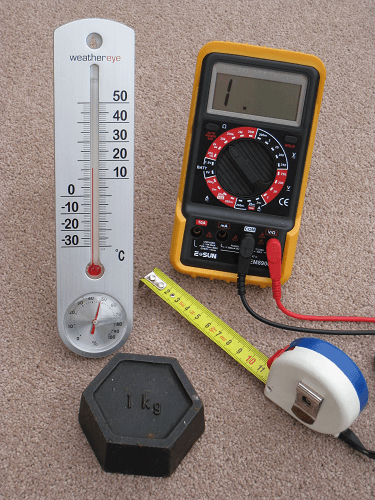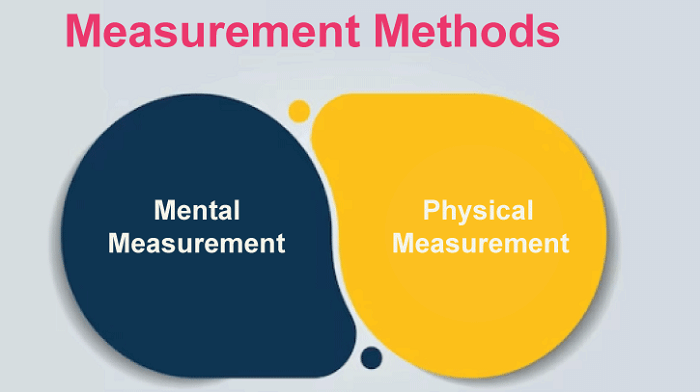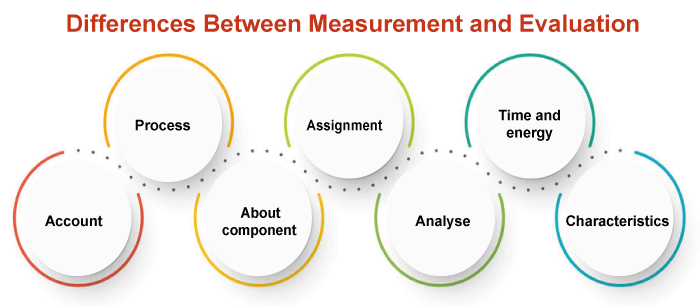Difference Between Measurement and EvaluationIn a professional or academic context, measuring and evaluation are helpful techniques for monitoring an individual's or a group's development. The measure evaluation's findings help to create innovative and practical strategies that might be used to ensure crucial performance in commercial and educational settings. 
A systematic process for determining an object's features is measurement. For instance, it establishes a thing's weight, breadth, density, height, and speed. Physical attributes can only be measured when it's vital to gauge features that tools can't detect. Measurement Definition
Measurement is assigning one of the sets of numerals to each group of objects, whether people or things, by the recognized norms or standards and describing them using acceptable terms, units, and symbols to characterize their status. Measuring in education refers to a numerical assessment of a student's success on an exam. A mechanical procedure systematically examines the qualities using suitable evaluation instruments. Making deductions is possible because it turns the variable into the variate. For instance, IQ is used to evaluate intelligence, and scores are used to measure the outcome variable. Additionally, it helps contrast the academic achievements of different pupils and emphasizes their strong and weak features. Information about Measurement
Although essential to human existence in this century, measurements are the only way of establishing objective values. They represent a certain kind of scientific judgment.
Measurement Methods
1. Mental Measurement Measurements of the mind are also referred to as Mental measurements. It is defined relative to other things rather than in absolute terms. It is evaluated based on the individual's response or critical observation rather than measured using any device. An example of a psychological or mental measurement is gauging how much work someone has completed. 2. Physical Measurement Physical measurement is the act of measuring anything that is physically real. Consider measuring someone's height or weight using a measuring tape or weighing scale and starting at zero points. Evaluation Definition
Giving the measure a value might be referred to as evaluation. It is a systematic and ongoing process in which the results of measuring an object, person, or activity's features are evaluated by defined requirements. Additionally, the relative location of the individual, thing, or activity is determined based on the quality. In evaluation, we assess how appropriate, desirable, or valuable something is by making judgments about it. Evaluation in education refers to the overall assessment of the student's development about
All factors significant for the student's or learner's growth are considered in the assessment process, not just the student's or learner's knowledge. Evaluation, therefore, encompasses four distinct fields, namely
Its objectives include monitoring student development, changing the educational system, and enhancing accountability for results. Information about Evaluation
Differences Between Measurement and Evaluation
1. Process Figuring out an object's characteristics and dimensions can be called measurement. The evaluation process, on the other hand, involves constant quantification and qualitative analysis based on value judgments. 2. Account Measurement explains observations that have a numerical expression or quantitative comments. On the other hand, evaluation considers both numeric and qualitative results. 3. Assignment Measuring suggests giving a person or object a number based on predetermined standards. Conversely, evaluation involves assigning marks, levels, or symbols based on established criteria. 4. About component Evaluation includes all components, such as cognitive, emotional, and psychomotor learning, in contrast to measurement, which focuses on one or more characteristics or qualities of a person or item. 5. Analyse When anything is measured, its size, height, speed, temperature, distance, and other attributes are expressed numerically. In comparison, evaluation establishes how well something is done by adding meaning or value evaluation to the data. In contrast to evaluation, which allows for logical assumptions about the learner, measurement does not allow for this. 6. Time and energy Because measurement employs instruments or equipment to accomplish its goals, it requires less time and energy. In contrast, evaluation involves passing value judgment and needs observation, which takes time and energy. 7. Characteristics Because it only considers a few characteristics of personality or trait, measuring has a constrained scope. However, evaluation takes into account every aspect before making a value determination. The examination also includes measuring. Its reach is hence wider. Evaluation is objectively focused, whereas measurement is content-based.
The Importance of Measurement and Evaluation
ConclusionWhether doing humanistic or scientific research, measurements and evaluations are crucial. The two main components of size are statistics and the capacity to value someone's production or talent. Evaluation allows success or failure assessment by utilizing information and knowledge. Because evaluations examine performance, they don't need to be quantified. Nowadays, the primary distinction between evaluation and measurement is that the former is qualitative while the latter is quantifiable.
Next TopicDifference between
|
 For Videos Join Our Youtube Channel: Join Now
For Videos Join Our Youtube Channel: Join Now
Feedback
- Send your Feedback to [email protected]
Help Others, Please Share










